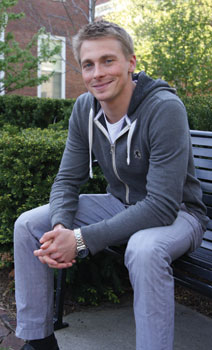Works in Progress: His Eyes on Chinaby Howard Hewitt |
| Printer-friendly version | Email this article |
|
The Bytom, Poland, native came to the United States as a high school foreign exchange student, attending high school in Mitchell, IN. He ended up at Wabash because of a high school friendship back home with Michael Opieczonek ’09. After a spring visit, then a semester attending college at home in Poland, he returned to the U.S. to study at Wabash. Lempa ’11 has a full-time job in Indianapolis now, but his eye is on China in the not-too-distant future. “I want to experience Chinese culture more,” the personable Lempa says. “Throughout the last two decades we’ve been reading about the rapid economic development in China. I first thought it would be interesting; second, I thought it would be a good asset.” Lempa made the most of a study-abroad semester in 2010 by going to China two months early and staying an extra month after his program ended. He believes the opportunity became reality because of his Wabash involvement. He was a Wabash residential assistant (R.A.) as a freshman and every year afterward. He earned political science department financial support for a summer internship at the British Consulate in Poland after his freshman year. The following summer he worked with his native Silesian alternative movement organization in marketing, and finally he worked for a large insurance and finance group in Poland. Along the way Lempa took advantage of Wabash networking opportunities. “It was a challenge to be in leadership positions,” he recalls of his early Wabash years. “I was an R.A. and forming and running my own club [the Case Study Club] as a person from an outside culture. I thought it was challenging to be leading Americans. I was never in leadership roles back home because there wasn’t a whole lot of opportunity. “I wanted to test myself because I thought having the skills to manage people would be an asset after college.” He found Wabash networking his greatest advantage. His Chinese study-abroad program didn’t start until March and he was torn between going home to Poland and staying in Crawfordsville. But in his heart and head he wanted to go China early to work on his language skills. Then he remembered meeting Khurram Tahir ’01 at a Wabash networking event and that Tahir was headed to China on a job assignment with Motorola. He sent an e-mail to Tahir seeking advice. It wasn’t 20 minutes before Tahir responded, insisting Lempa find a language program and come stay with him in Beijing until his program started in Shanghai. Lempa, with sincere incredulity, says Tahir was more than generous. He had to leave the country for 10 days when Lempa was due to arrive, so he just left keys for the Wabash student. “He wouldn’t take any money from me for staying there. He introduced me to colleagues. He did everything he could to help me. He’s an awesome guy.” That jumpstart allowed Lempa to test out of introductory Mandarin once he got to Shanghai and start with a 200-level course. At the end of his formal study-abroad program, he got a teacher’s assistant position with Wabash Professors Ethan Hollander and Melissa Butler, who were in Shanghai for the summer as visiting professors. The seven months in China studying the language, going to school, and living in the diverse culture convinced him he wanted to return. Still, the thoughtful and pragmatic young man knew his Chinese was not fluent and, frankly, neither was his English. He decided the best road back to China would be a job in the U.S. where he would learn valuable skills and gain experience that he could take to a job in China. He was hired by Brightpoint to join a management training program, with an eye toward working in that company’s Asian market in the near future. “That summer in China completely changed my plans for the future,” he says. “After studying abroad, I realized there is so much to see in the world and so much more to see of China. There’s so much more Chinese for me to learn. “I have decided not to go back home immediately. Going back home is something you always have. I was thinking of going directly to China, but I’d be competing with Chinese graduates for the best jobs.” Instead he’s working at Brightpoint in Indianapolis and continuing to study Chinese, an effort the company supports financially. Even as a Wabash graduate and having started a new job earlier this summer, Lempa can’t get China off his mind. “It’s just the fact that the Chinese language is so interesting,” he says. “I had no idea it would thrill me so much to learn Chinese. It’s so challenging and brings so much satisfaction when you get things right. “It’s most fascinating when you’re in China. People will tell you that you’ll get along if you speak English in China, and you definitely can. But when you speak Chinese it opens a whole different world.” Lempa is thankful for the world Wabash opened to him. While he credits the mentoring and advice of Professor Butler, it’s friendships with alums like Tahir, Sava Kobilarov ’01, and Bastian Wonschik ’00 that advanced his education and maturation. “When I first got here I was shocked at how approachable professors were for me. That’s unthinkable back home. You see it between students and faculty, students and alumni. It’s very different than Europe, where there is no or very little connection.” It’s those connections he values most. “I think the opportunity to actually do things here is as significant as the study. That weighs more than the actual academic development. You need to have certain skills and knowledge, but I’ve been reminded in the last three years that very often it’s the networking. I think managing and forming relationships has taught me a lot.”
|

